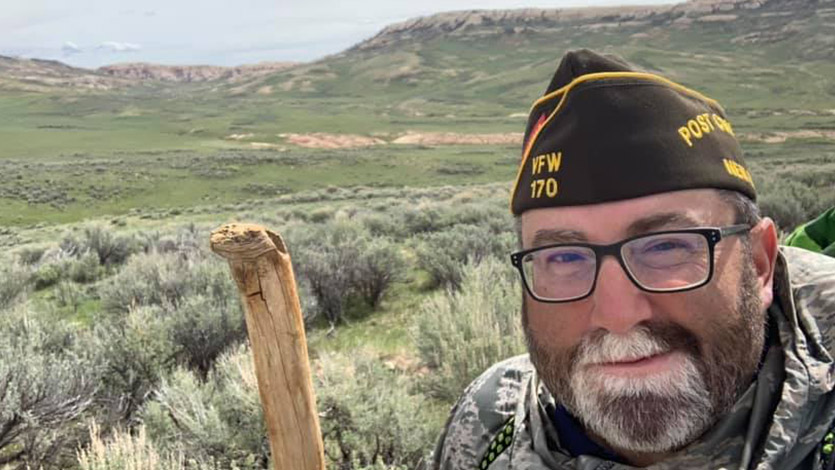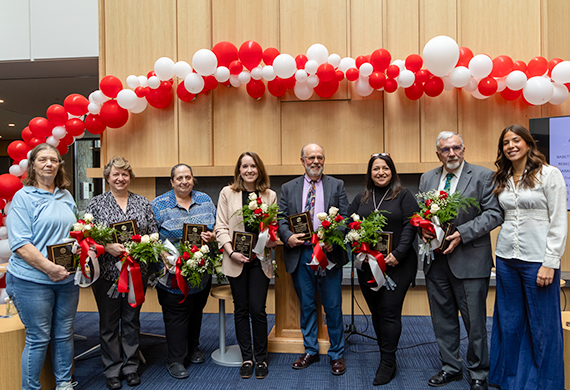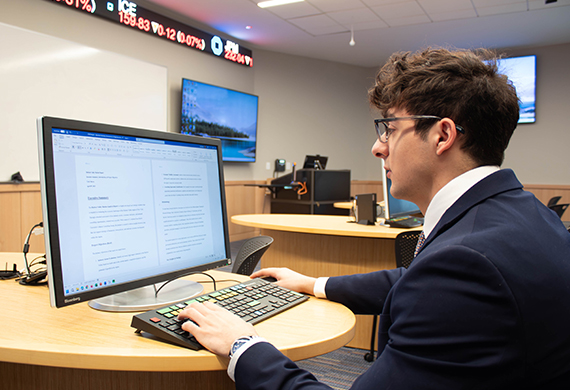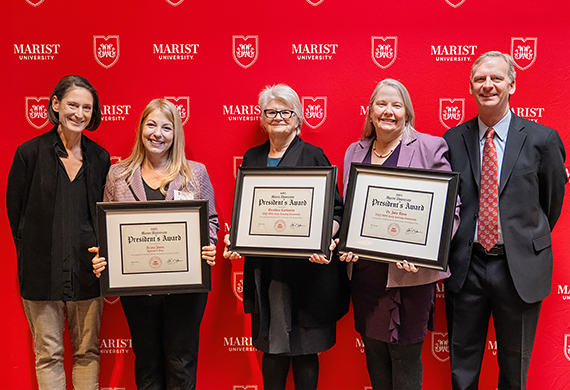Update from the Road

English Professor Tommy Zurhellen talks about his cross-country trek for veterans’ issues.
May 30, 2019—In April, Associate Professor of English Tommy Zurhellen announced the launch of an ambitious project, VetZero. Zurhellen, a Navy veteran who serves as the Commander of the Veterans of Foreign Wars post in Poughkeepsie, is aiming to raise more than $40,000 for veterans’ issues as he walks across the country.
For more than a month, Zurhellen has been walking an average of 22 miles each day (to recognize the recent Department of Veterans Affairs statistic that every day in America, 22 veterans take their own lives).
The College, long recognized as a Military Friendly School, has supported Zurhellen’s effort since the beginning. “Tommy’s project is the embodiment of Marist’s commitment to the social good,” said Executive Vice President Geoffrey Brackett. “We applaud his mission and are excited to support his goal.”
On April 10 at a press conference on campus, the College gave you a send-off as you prepared to embark on your VetZero adventure. You started walking on April 15 in Portland, Oregon and now you’re about to head into Wyoming. What has it been like so far?
TZ: The last month or so has really been a life-changing experience for me. I’m exploring a part of the country I’ve never seen before, and at times, it almost feels like I am in a different country with so many wide-open spaces. Time feels slower out here in the Western states, for sure. In that way, it’s been refreshing. Having sunny skies and warm temperatures for the first four weeks was fortunate. And having friends —new and old— along the way has helped immensely as well.
You’re walking 22 miles per day. Physically, has it been more difficult than you expected?
TZ: This may sound weird, but the physical part is the easy part. I think anyone can walk eight hours a day if they take their time and build slowly. It’s the mental part of the project that is the hard part. Most of us are so immersed in our daily lives of multi-tasking, always worrying about what we have to do next. We are so connected each day to our technology that basically runs our lives, with calendars, to-do lists, and so on. Our lives are very complicated, and that wears us down. But out on the open road, life is simple. All I have to do today is walk. And tomorrow, all I have to do is walk. Once I disconnected from my old self and stopped worrying about what comes next, life has become a lot easier. That was the real hard part.
What has been the biggest surprise?
TZ: I think the biggest surprise is how many things have gone right. I thought I had planned everything diligently, and as we all know, life throws us plenty of curveballs. But out here, I’ve rarely gone a day without something good happening, usually via the kindness of complete strangers.
Your fundraising has been successful, with more than $15,000 raised so far. Do you feel like you’re achieving your other goal of sharing the stories of fellow veterans?
TZ: The most important part of the project to me is talking with as many veterans in America as I can and sharing their stories with a wider audience. So far, we’ve shared some great stories of vets I’ve met on the road, and I’m looking forward to finding many more by the time I get home in August. Sometimes, I almost feel like an anthropologist out here, trying to collect the valuable and vital stories of our veterans.
Are you nervous about what lies ahead?
TZ: Wyoming does make me nervous, I will admit! There will be multiple days in a row where I will be isolated from any towns or communication. But I’m also looking forward to the challenge. This project would be a lot easier if I had a support vehicle following me, but I also think it is an important part of the project, being virtually a homeless veteran.
Do you think this experience will have an impact on your teaching at Marist? If so, how?
TZ: I think this project has already altered my teaching at Marist. As I walk, I am already thinking about how an experience may be used in the writing classroom. And in the fall, I am teaching an Honors seminar on Veterans Literature, so these experiences will definitely translate to the classroom. I’ve been teaching at Marist for 15 years now, and I feel like a good professor should always practice what they preach, so to speak. You can’t convince your students to go out and change their world unless you’ve honestly tried it yourself. So, here I am trying!
You’ve said from the beginning you plan to write a book about this trek. Is that still in the cards?
TZ: It’s going to be a great book. I’m writing it as I go! It’s a book about service that will try to answer the age-old question, can one person change the world?
Follow Zurhellen’s progress on social media: Facebook, Twitter, and Instagram. Read media coverage about the project here.



